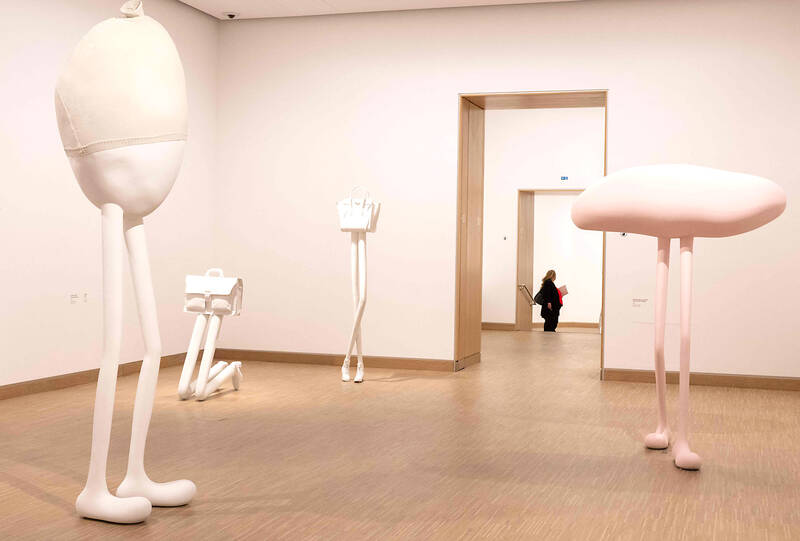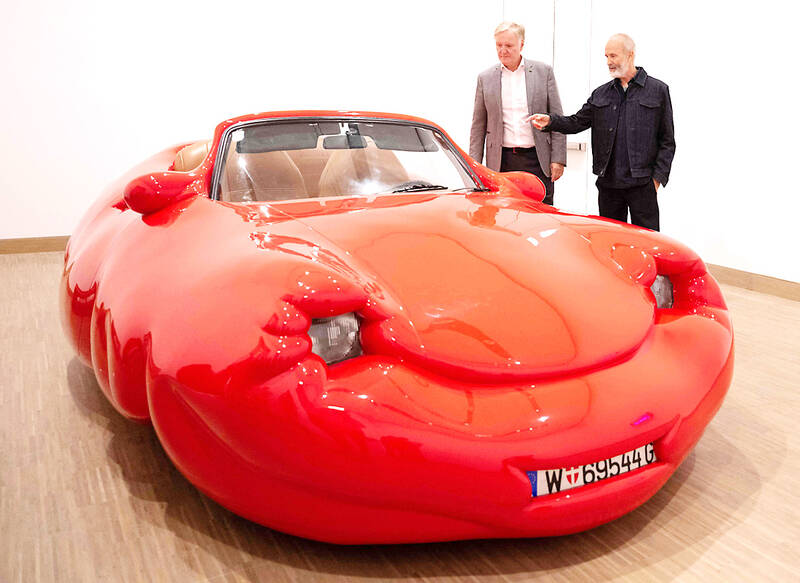A fat Ferrari, pickles on pedestals and two sausages in an intimate embrace — welcome to the weird world of Erwin Wurm, one of Austria’s most famous contemporary artists, who wants us to embrace the absurd.
If we look at “our world from another perspective, from the perspective of the absurd, we might see more,” Wurm said as a retrospective of his work opened in Vienna’s Albertina Museum to mark his 70th birthday.
“Everything seems normal to us,” he said, but if we took another look “we might see different things, and that might be interesting for us to understand things differently.”

Photo: AFP
The show is a reflection on social norms, consumerist society and the diktats of appearance and even identity, with his quirky take on quintessentially Austrian staples such as sausages and pickled cucumbers alongside luxury bags on giant legs, miniature houses and stacks of clothing.
“He likes to take everyday things... and present them as abstract elements, to make artworks out of them,” curator Antonia Hoerschelmann said.
PLAYFUL

Photo: AFP
Born in the central city of Bruck an der Mur, Wurm wanted to become a painter, but after a university entrance exam found himself in a sculpture class instead.
“It was a big shock... I was frustrated and sad, but then after some time I thought that maybe it’s a challenge. And from then on I started to think about the notion of sculpture,” Wurm recalled.
His walk-in rural school allows visitors to squeeze inside through a small entrance, recalling Wurm’s 2010 work Narrow House based on his parental home.
Wurm said he was trying to recreate the “claustrophobic” and “quite rigid” post-World War II Austria where he grew up.
But he also offers more playful approaches.
In his famous One Minute Sculptures, the public is invited to lie down for a minute on tennis balls or slip into sweaters to “connect them much more to a piece.”
There is a darker undercurrent to some of his most recent creations, such as a sculpture of what seems like someone wearing a shirt and pants but with no head.
“Instead of the people I have the clothes. It’s like a shadow of something... We still can recognize something, a human being, but not a person. So the personality is cut out,” he said, evoking a “dystopian future”.
“I’m not happy with our world. How it’s progressing and how we treat each other. It’s just unbelievable, terrible,” he said.
The idea of having a retrospective of his works did not appeal to him right away.
“I’m not interested in looking back but in looking forward,” he said. “I like to work, it’s the center of my life and I would like to go on and develop new ideas and develop the old ones.”

Jacques Poissant’s suffering stopped the day he asked his daughter if it would be “cowardly to ask to be helped to die.” The retired Canadian insurance adviser was 93, and “was wasting away” after a long battle with prostate cancer. “He no longer had any zest for life,” Josee Poissant said. Last year her mother made the same choice at 96 when she realized she would not be getting out of hospital. She died surrounded by her children and their partners listening to the music she loved. “She was at peace. She sang until she went to sleep.” Josee Poissant remembers it as a beautiful

Before the last section of the round-the-island railway was electrified, one old blue train still chugged back and forth between Pingtung County’s Fangliao (枋寮) and Taitung (台東) stations once a day. It was so slow, was so hot (it had no air conditioning) and covered such a short distance, that the low fare still failed to attract many riders. This relic of the past was finally retired when the South Link Line was fully electrified on Dec. 23, 2020. A wave of nostalgia surrounded the termination of the Ordinary Train service, as these train carriages had been in use for decades

Lori Sepich smoked for years and sometimes skipped taking her blood pressure medicine. But she never thought she’d have a heart attack. The possibility “just wasn’t registering with me,” said the 64-year-old from Memphis, Tennessee, who suffered two of them 13 years apart. She’s far from alone. More than 60 million women in the US live with cardiovascular disease, which includes heart disease as well as stroke, heart failure and atrial fibrillation. And despite the myth that heart attacks mostly strike men, women are vulnerable too. Overall in the US, 1 in 5 women dies of cardiovascular disease each year, 37,000 of them

March 2 to March 8 Gunfire rang out along the shore of the frontline island of Lieyu (烈嶼) on a foggy afternoon on March 7, 1987. By the time it was over, about 20 unarmed Vietnamese refugees — men, women, elderly and children — were dead. They were hastily buried, followed by decades of silence. Months later, opposition politicians and journalists tried to uncover what had happened, but conflicting accounts only deepened the confusion. One version suggested that government troops had mistakenly killed their own operatives attempting to return home from Vietnam. The military maintained that the